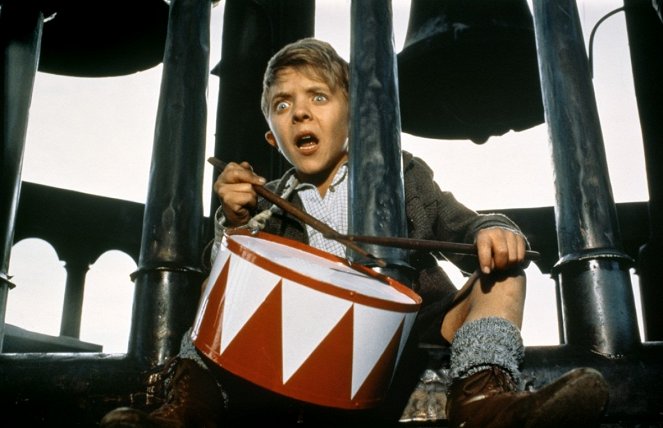Directed by:
Volker SchlöndorffCinematography:
Igor LutherCast:
Mario Adorf, Angela Winkler, David Bennent, Katharina Thalbach, Daniel Olbrychski, Tina Engel, Berta Drews, Andréa Ferréol, Heinz Bennent, Ilse Pagé (more)VOD (3)
Plots(1)
Voker Schloendoff's "Tin Drum", based on Guenter Grass' acclaimed novel, tells the story of Oskar Matzerath, born in Danzig in 1924 with an intellect far beyond his infancy. As he witnesses the hypocrisy of adulthood and the irresponsibility of society. Oskar rejects both, and, at his third birthday, refuses to grow older and expresses his view of the world with piercing screams and frantic pounding on his tin drum as the world moves toward World War II. (official distributor synopsis)
(more)Reviews (5)
Schlöndorff’s adaptation of The Tin Drum can be criticised for taking a conventional approach to Grass’s disturbing novel and for stripping it of a number of its literary specifics, particularly the storytelling method itself. This conversion into a form that doesn’t pose any formalistic obstacles to viewers ultimately turns out to be a brilliant piece of work. The film’s conventional, essentially linear narrative and the precise work of the set-design, costume and casting departments serve as a Trojan horse that smuggles the provocative core of the novel behind the defensive bulwark of audience expectations. The clever subversiveness of the adaptation is evident already in the opening credits, where the director paraphrases the classic Japanese director Yasujiro Ozu, who introduced his brilliant melodramas and comedies about family relationships and generational conflicts in a middle-class setting with credits set against a background of ordinary, everyday fabric. Schlöndorff starts his film in the same way, except the background in his rendition is the brown fabric of Nazi uniforms. With the same causticity and mix of the high and the low and the artistic and the perverse, the film depicts the society of the first half of the 20th century and its paradoxes, madness, absurdities and, above all, the degradation at the core of its arrogance. It is too simplistic to see the central character, Oskar, as a rebel who refuses to participate in the world of adults. Though Schlöndorff’s adaptation leaves out the third part of the novel, in which the protagonist goes through the post-war era and becomes a monster, the character’s ambiguity is developed in the part of the plot that the film covers. Seeing the war through the eyes of a child here means something different from what we are accustomed to from poignantly kitschy narratives. Besides the overarching disturbing grotesqueness, The Tin Drum shows childhood not as a virtue, but as a metaphor for the obstinate and blind refusal to evolve that is inherent in all of the film’s adult characters. Oskar represents the self-absorbed eternal child who sails through history. Behind his seeming naïveté and ignorance, however, there is a rational malevolence and stubbornness that differs very little from the delusions of grandeur held by the petty bourgeoisie, which is exposed here as a cornerstone of Nazism. --- PS: If anyone wants an unconventional adaptation of The Tin Drum, they can find it in the underground mess United Trash.
()
So it’s like this – I watched it at school with my class. I was hearing from all directions: "That's disgusting!", "That's a terrible movie.", "I'm going to kill that Oskar!", "This movie has only one negative character and that's Oskar.", etc... so I guess I can't even make up my own mind anymore, or rather – I do, but I'm out of words to express it. I understand what it was about, I know when it was written and for what purpose. Period. The end. Plus, David Bennent was really excellent! He really played it to the hilt, after all, 90% of my class started hating him, and when so many people in my class agree on something... well, that's saying something! :-D
()
When it premiered, the critics received The Tin Drum with certain reservations. They claimed that the film is merely a literal adaptation of the novel to the screen, and director Schlöndorff allegedly didn't incorporate anything special or outstanding into the film. Nevertheless, the film was awarded several international accolades. Moreover, even if the film critics were right, it is still an adaptation of one of the most significant European novels, an undisputed classic with an exceptional and extreme protagonist, dealing with groundbreaking events in (not only) German history. The Tin Drum is not a pleasant or likable film. Its characters perform ugly acts and do not allow you to feel sympathy towards them. A conformist and a Nazi in one, a stunted weirdo, a voracious bitch – that's not exactly the company you'd want to spend tea time with. The sexuality served by Schlöndorff can unsettle not only a staunch puritan. Oskar's peculiar position between a child's perception of the world and an adult's rational thinking constantly confuses the audience. Several scenes are disturbing to the point that they unsettle you, and if nothing else, the performance of the actor portraying Oskar is so suggestive that you will probably not forget it. As a bonus, you will witness the depiction of one of the most important and symbolic events of the German-Polish war - the bloody siege of the Gdansk post office. The Tin Drum is a unique and indescribable work that no film enthusiast should miss. Overall impression: 90%.
()
Wonderfully creepy and evil.
()
"Plechový bubínek" is definitely an interesting movie that can make your stomach turn, but it will also surprise you with what it depicts and how it is depicted. There is a little boy in the scenes that will definitely move you. In this regard, it is undoubtedly a successful spectacle. However, as a whole, it did not have such a strong impact on me.
()

